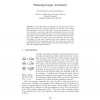Free Online Productivity Tools
i2Speak
i2Symbol
i2OCR
iTex2Img
iWeb2Print
iWeb2Shot
i2Type
iPdf2Split
iPdf2Merge
i2Bopomofo
i2Arabic
i2Style
i2Image
i2PDF
iLatex2Rtf
Sci2ools
123
click to vote
CC
2004
Springer
2004
Springer
Widening Integer Arithmetic
Abstract. Some codes require computations to use fewer bits of precision than are normal for the target machine. For example, Java requires 32-bit arithmetic even on a 64-bit target. To run narrow codes on a wide target machine, we present a widening transformation. Almost every narrow operation can be widened by sign- or zero-extending the operands and using a target-machine instruction at its natural width. But extensions can sometimes be avoided, and our transformation avoids as many as possible. The key idea is knowing what each operation can accept in the high bits of its arguments and what it can guarantee about the high bits of its result. This knowledge is formalized using fill types, which drive the widening transformation.
Related Content
| Added | 20 Aug 2010 |
| Updated | 20 Aug 2010 |
| Type | Conference |
| Year | 2004 |
| Where | CC |
| Authors | Kevin Redwine, Norman Ramsey |
Comments (0)

